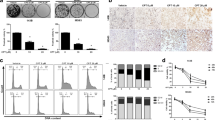Abstract
Background
A natural compound deoxypodophyllotoxin (DPT) possesses potent anti-proliferative and anti-tumor properties on several cancer types. It triggers cell cycle arrest followed by apoptosis through various cellular processes. However, it is limited to the action mechanism of DPT-mediated cell death modes via apoptosis and autophagy.
Methods
Cell viability assay, morphological changes, annexin-V/propidium iodide (PI) assay, reactive oxygen species (ROS), acridine orange staining, and Western blot analyses were evaluated.
Results
We demonstrated that DPT induced both apoptosis and autophagy via production of mitochondrial reactive oxygen species (ROS). DPT suppressed the PI3 K/AKT/mTOR signaling cascades to lead autophagy process, resulting from conversion of light chain 3-I (LC3-I) into LC3-II and acidic vesicular organelles (AVOs) formation. Even if DPT-induced ROS were occurred in both apoptosis and autophagy, inhibition of ROS generation enhanced cell viability. Otherwise, 3-methyladeine (3-MA) impeding on autophagy accelerated an apoptotic response caused by DPT. Therefore, these findings suggest that DPT triggers cytoprotective autophagy against cytotoxic apoptosis.
Conclusion
Autophagy is required for cell survival by inhibition of apoptosis through down-regulation of PI3K/AKT/mTOR pathway against DPT-induced apoptosis in U2OS cells.
Similar content being viewed by others
References
Durfee RA, Mohammed M, Luu HH. Review of osteosarcoma and current management. Rheumatol Ther 2016;3:221–43.
Michaelson MD, Smith MR. Bisphosphonates for treatment and prevention of bone metastases. J Clin Oncol 2005;23:8219–24.
Jin Y, Liu J, Huang WT, Chen SW, Hui L. Synthesis and biological evaluation of derivatives of 4-deoxypodophyllotoxin as antitumor agents. Eur J Med Chem 2011;46:4056–61.
Wang YR, Xu Y, Jiang ZZ, Guerram M, Wang B, Zhu X, et al. Deoxypodophyllotoxin induces G2/M cell cycle arrest and apoptosis in SGC-7901 cells and inhibits tumor growth in vivo. Molecules 2015;20:1661–75.
Yong Y, Shin SY, Lee YH, Lim Y. Antitumor activity of deoxypodophyllotoxin isolated from Anthriscus sylvestris: induction of G2/M cell cycle arrest and caspase-dependent apoptosis. Bioorg Med Chem Lett 2009;19:4367–71.
Shin SY, Yong Y, Kim CG, Lee YH, Lim Y. Deoxypodophyllotoxin induces G2/M cell cycle arrest and apoptosis in HeLa cells. Cancer Lett 2010;287:231–9.
Lowe SW, Lin AW. Apoptosis in cancer. Carcinogenesis 2000;21:485–95.
Kenific CM, Debnath J. Cellular and metabolic functions for autophagy in cancer cells. Trends Cell Biol 2015;25:37–45.
Cuyas E, Corominas-Faja B, Joven J, Menendez JA. Cell cycle regulation by the nutrient-sensing mammalian target of rapamycin (mTOR) pathway. Methods Mol Biol 2014;1170:113–44.
Tooze SA, Yoshimori T. The origin of the autophagosomal membrane. Nat Cell Biol 2010;12:831–5.
Blume-Jensen P, Hunter T. Oncogenic kinase signalling. Nature 2001;411:355–65.
Vivanco I, Sawyers CL. The phosphatidylinositol 3-Kinase AKT pathway in human cancer. Nat Rev Cancer 2002;2:489–501.
Manning BD, Cantley LC. AKT/PKB signaling: navigating downstream. Cell 2007;129:1261–74.
Songyang Z, Baltimore D, Cantley LC, Kaplan DR, Franke TF. Interleukin 3-dependent survival by the Akt protein kinase. Proc Natl Acad Sci U S A 1997;94:11345–50.
Petiot A, Ogier-Denis E, Blommaart EF, Meijer AJ, Codogno P. Distinct classes of phosphatidylinositol 3′-kinases are involved in signaling pathways that control macroautophagy in HT-29 cells. J Biol Chem 2000;275:992–8.
Bhaskar PT, Hay N. The two TORCs and Akt. Dev Cell 2007;12:487–502.
Li ZY, Yang Y, Ming M, Liu B. Mitochondrial ROS generation for regulation of autophagic pathways in cancer. Biochem Biophys Res Commun 2011;414:5–8.
Wang Q, Liang B, Shirwany NA, Zou MH. 2-Deoxy-D-glucose treatment of endothelial cells induces autophagy by reactive oxygen species-mediated activation of the AMP-activated protein kinase. PLoS One 2011;6:e17234.
Azad MB, Chen Y, Gibson SB. Regulation of autophagy by reactive oxygen species (ROS): implications for cancer progression and treatment. Antioxid Redox Signal 2009;11:777–90.
Pan X, Zhang X, Sun H, Zhang J, Yan M, Zhang H. Autophagy inhibition promotes 5-fluorouraci-induced apoptosis by stimulating ROS formation in human non-small cell lung cancer A549 cells. PLoS One 2013;8:e56679.
Xi G, Hu X, Wu B, Jiang H, Young CY, Pang Y. Autophagy inhibition promotes paclitaxel-induced apoptosis in cancer cells. Cancer Lett 2011;307:141–8.
Yuan L, Wei S, Wang J, Liu X. Isoorientin induces apoptosis and autophagy simultaneously by reactive oxygen species (ROS)-related p53, PI3K/Akt, JNK, and p38 signaling pathways in HepG2 cancer cells. J Agric Food Chem 2014;62:5390–400.
Cho HJ, Yu SN, Kim KY, Sohn JH, Oh H, Ahn SC. Screening and purification of an anti-prostate cancer compound, deoxypodophyllotoxin, from Anthriscus sylvestris Hoffm. J Life Sci 2009;19:9–14.
Kim KY, Cho HJ, Yu SN, Kim SH, Yu HS, Park YM, et al. Interplay of reactive oxygen species, intracellular Ca(2+) surge and loss of mitochondrial homeostasis in the apoptotic ablation of prostate cancer cells by deoxypodophyllotoxin. J Cell Biochem 2013;114:1124–34.
Kim KY, Yu SN, Lee SY, Chun SS, Choi YL, Park YM. Salinomycin-induced apoptosis of human prostate cancer cells due to accumulated reactive oxygen species and mitochondrial membrane depolarization. Biochem Biophys Res Commun 2011;413:80–6.
Martinou JC, Desagher S, Antonsson B. Cytochrome c release from mitochondria: all or nothing. Nat Cell Biol 2000;2:E41–3.
Brunet A, Datta SR, Greenberg ME. Transcription-dependent and -independent control of neuronal survival by the PI3K-Akt signaling pathway. Curr Opin Neurobiol 2001;11:297–305.
Sullivan LB, Chandel NS. Mitochondrial reactive oxygen species and cancer. Cancer Metab 2014;2:17.
Ouyang L, Shi Z, Zhao S, Wang FT, Zhou TT, Liu B. Programmed cell death pathways in cancer: a review of apoptosis, autophagy and programmed necrosis. Cell Prolif 2012;45:487–98.
Ding L, Wang S, Wang W, Lv P, Zhao D, Chen F, et al. TanshinoneII an affects autophagyand apoptosis of glioma cells by inhibiting phosphatidylinositol 3-kinase/Akt/Mammalian target of rapamycin signaling pathway. Pharmacology 2016;99:99–106.
Jung CH, Ro SH, Cao J, Otto NM, Kim DH. mTOR regulation of autophagy. FEBS Lett 2010;584:1287–95.
Ling YH, Aracil M, Zou Y, Yuan Z, Lu B, Jimeno J. PM02734 (elisidepsin) induces caspase-independent cell death associated with features of autophagy, inhibition of the Akt/mTOR signaling pathway, and activation of death-associated protein kinase. Clin Cancer Res 2011;17:5353–66.
Author information
Authors and Affiliations
Corresponding authors
Rights and permissions
About this article
Cite this article
Kim, SH., Son, KM., Kim, KY. et al. Deoxypodophyllotoxin induces cytoprotective autophagy against apoptosis via inhibition of PI3K/AKT/mTOR pathway in osteosarcoma U2OS cells. Pharmacol. Rep 69, 878–884 (2017). https://doi.org/10.1016/j.pharep.2017.04.007
Received:
Revised:
Accepted:
Published:
Issue Date:
DOI: https://doi.org/10.1016/j.pharep.2017.04.007




